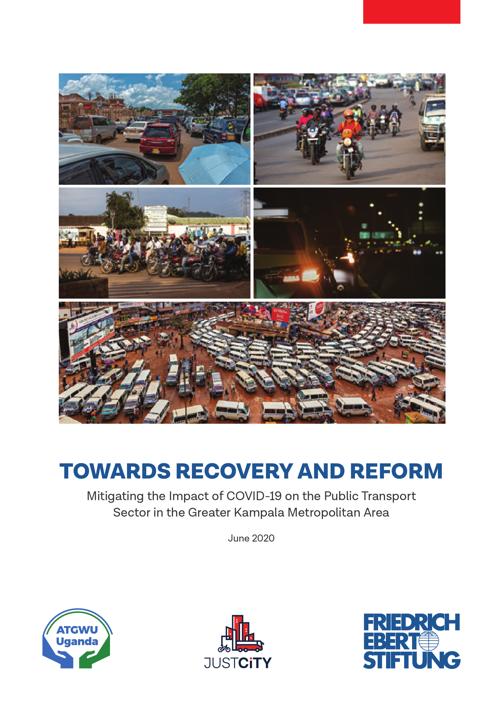Publikationen der StiftungTowards recovery and reform Titel
Titelaufnahme
- TitelTowards recovery and reform : mitigating the impact of COVID-19 on the public transport sector in the Greater Kampala Metropolitan Area
- Körperschaft
- Erschienen
- Umfang1 Online-Ressource (III, 35 Seiten) : Illustrationen
- AnmerkungLiteraturverzeichnis Seite 19
- SpracheEnglisch
- DokumenttypDruckschrift
- Schlagwörter (LOCAL);
- Schlagwörter
- Geografika
- ISBN978-9970-535-12-5
- URN
- Das Dokument ist frei verfügbar
- Nachweis
- Archiv
The outbreak of the corona virus disease has been quick and disruptive, slowing the global economy to a near standstill and exposing pre-existing socio-economic vulnerabilities, especially among low-income earners. The reported disproportionate impacts among the poorer communities in developed and developing countries could become its salient hallmark.
Across the globe, the corona virus disease has disrupted life as we knew it and introduced a new normal that might stay with us for the foreseeable future. Due to a rapid escalation in new infections across many countries outside of China, coupled by little or no action on the part of many governments, the WHO upgraded its characterization of corona virus disease to a pandemic and recommended a raft of containment measures with social distancing and hand hygiene at the centre of the global response. By March 26, 2020, the World Economic Forum reported that an estimated three billion people around the world were under some sort of government-enforced orders to implement social distancing, ranging from suspension of public gatherings and non-essential travel to mandatory quarantine, confinement or total/partial lockdown. Whereas these containment measures have high efficacy in containing the corona virus disease, they have the opposite effect on the economy, especially in the informal economy.
Uganda has been no exception. Starting March 18th, 2020, the government began implementing measures to contain the spread of the virus. These included a total lockdown of schools and institutions of higher learning, suspension of public and private transport, religious centres and open markets as well as closure of all national borders. In addition, the government also ordered a night curfew to safeguard public safety and security and enforced the suspension of public gatherings, among other measures. Consequently, with the exception of trade in essential goods and services, Uganda has effectively been on lockdown for now 70 days. Public transport is set to re-open on June 4th albeit with new COVID-19 standard operating procedures to especially ensure social distancing and hand hygiene.
The COVID-19 containment measures have created new uncertainties for individuals and businesses alike. Now that the lockdown is being gradually relaxed, many businesses, especially in the informal economy, are faced with new and urgent requirements to comply with COVID-19 containment guidelines. Many of these new guidelines mean additional expenses, to ensure social distancing and hand hygiene in the workplace. In the informal economy, these requirements eat into the small earnings, further fuelling concerns especially as it is not yet clear when the guidelines will ever be lifted. In addition, the new guidelines issued by Kampala City Council Authority (KCCA) on the reopening of public transport in the city show that besides complying with COVID-19 guidelines, those engaged in the city�s public transport sector will have to comply with additional measures meant to further organize, streamline and regulate the sector. These new measures, albeit necessary, could have come too early and too quick for the sector, further adding to uncertainty. Needless to say, business disruptions due to corona virus disease have resulted in additional concerns over income loss, job loss, bankruptcies or closures, among others.
These challenges require immediate attention and intervention. Unfortunately, the rapid spread of COVID-19 found most governments inadequately prepared. The government of Uganda is yet to announce a consolidated business stimulus, but has in the interim spent in excess of Shs 933 billion in supplementary budget and donor funding to support security, health and disaster preparedness efforts including providing food relief, readying the health sector and rolling out public communication on COVID-19.
Government has been late in putting forth practical measures to mitigate the full effects of the lockdown on the economy and the impacted livelihoods. Given this apparent slowness to act and the relatively high poverty rate in Uganda, the harsh reality is that there is a certain likelihood of increasing vulnerability, especially in the informal economy. The livelihood support mechanisms of many poor families are bound to fail much sooner than later � in terms of access to daily essentials such as food, medical care, water, and even social capital.
It is also important to note that Uganda�s economy relies a lot on informal employment, and that many citizens in the working age bracket between 14 and 64 years are employed in the informal economy. The latest 2011 census of business establishments in Uganda shows that 93% of all businesses established in the country are informal. In addition, a recent 2015 urban labour force survey conducted in Kampala and the surrounding areas of Mukono and Wakiso shows that up to 87% of the total employment in the Greater Kampala Metropolitan Area is in the informal economy.
